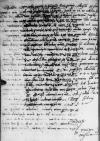Letter #759
Ioannes TRESLER to Ioannes DANTISCUSGdańsk (Danzig), 1532-02-25
Manuscript sources:
Auxiliary sources:
Prints:
| ||||||||
Text & apparatus & commentary Plain text Text & commentary Text & apparatus
Reverendissimo in Christo Praesuli ac Domino, domino
Salutem dico, Reverendissime Praesul, gratiosissime domine.
Ad litteras meas, quae per dominum doctorem
Reverendissime Domine. Pervenit ad nos rumor quidam, sed crebrior magisque constans, quam ut vanus credi possit,
Nam cum amico quodam super hac re eo usque ea crevit contentio, ut uterque decem deposuerit aureos controversiae arbitrium utriusque consensu a Reverendissima Dominatione Vestra exspectatur written over mus⌈musturtur written over mus⌉. Nam id in ea aula, in qua modo Reverendissima Dominatio Vestra versatur, minime occultum esse poterit. Faciet itaque Reverendissima Dominatio Vestra  BCz, 243, p. 218 rem mihi gratissimam, si quamprimum fieri poterit, aliquem ex suis ad nos perscribere iusserit, quid in ea re actum sit. Nam festum Natalis Christi proxime praeteritum scopus est nostrae contentionis. Si pro eo tempore nostri urbem possederint, succubui, si vero id temporis vel ante
BCz, 243, p. 218 rem mihi gratissimam, si quamprimum fieri poterit, aliquem ex suis ad nos perscribere iusserit, quid in ea re actum sit. Nam festum Natalis Christi proxime praeteritum scopus est nostrae contentionis. Si pro eo tempore nostri urbem possederint, succubui, si vero id temporis vel ante
Ergo, Reverendissime Domine, cupidissime adventum Reverendissimae hidden by binding⌈[Reverendissimae]Reverendissimae hidden by binding⌉ Dominationis Vestrae exspecto adeoque graviter Reverendissimae Dominationis Vestrae desiderium fero, ut iam aliquoties temptarim per occa hidden by binding⌈[a]a hidden by binding⌉sionem in aulam
Dat(ae) or Dat(um)⌈Dat(ae)Dat(ae) or Dat(um)⌉
Reverendissimae Dominationis Vestrae deditissimus servitor


